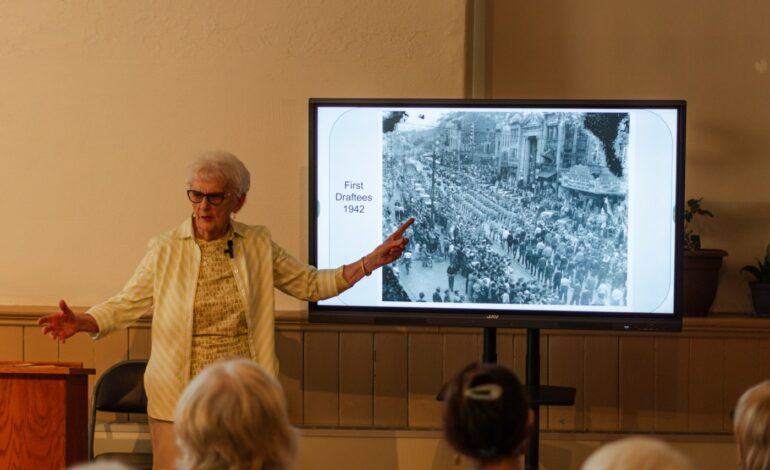96-Year-Old Dorothy Lehman Reflects on WWII Home Front Today

UPDATE: Today, August 14, 2025, 96-year-old Dorothy Lehman Loy shared her poignant memories of life on the home front during World War II at the Schuylkill County Historical Society in Pottsville. This compelling talk marks the 80th anniversary of the end of the war, a moment that profoundly shaped her life.
Lehman vividly recalled the moment on December 7, 1941, when she was called home from a friend’s house. “My parents and grandparents were sitting around the radio listening to President Roosevelt talk about a place called Pearl Harbor,” she shared. Those words would change the course of her life and history.
“Yesterday, December 7, 1941, a date which will live in infamy,” Roosevelt announced, leading to Congress declaring war the next day. For young Lehman, this was the beginning of an era filled with uncertainty and sacrifice.
As a junior at Pottsville High School when the war concluded on August 14, 1945, Lehman’s experiences resonated deeply with the audience of about 50 attendees. Many were captivated by her detailed recollections, often laced with humor.
In her talk, Lehman humorously noted that in 1941, “young women wore skirts, not slacks,” and that silk stockings became scarce as silk was redirected for parachutes. “Some girls used makeup to simulate stockings until it rained and the makeup ended up on their shoes,” she said, eliciting laughter from the crowd.
She painted a stark picture of the local community, where Schuylkill’s coal mines and railroads thrived, fueling the war effort. Many women became Rosie-the-Riveters, working in a defense plant in nearby Cressona. Lehman’s father, Fred, served as an air raid warden, ensuring blackout rules were followed during air raid warnings.
Rationing defined daily life; food, gasoline, and even shoes were scarce. Dot grimaced as she recalled the infamous Spam-on-lettuce sandwiches served at school, and how butter was replaced by a lard-like margarine that required mixing with red dye. “Nobody complained,” she emphasized. “We were at war.”
Lehman explained how the war was financed by the American people through the purchase of war bonds. Families saved quarters until they amassed $18 for a bond that was redeemable for $25 years later. She recalled her school choir performing at a war bond drive featuring Fred Waring & The Pennsylvanians.
News of the war trickled in through radios and newspapers, with government censorship often obscuring harsh realities. Lehman maintained a pen pal in England, but their letters never mentioned the bombings London endured. She vividly recounted the sorrowful role of a man named Brobst, who had the heartbreaking task of notifying families about loved ones injured or killed in action.
The emotional weight of the war struck when a school assembly revealed that one of their classmates had been killed. “Our principal was normally a happy man,” Lehman recounted, “but that day, he had to deliver the tragic news.”
The streets of Pottsville erupted with joy upon learning of Japan’s surrender aboard the USS Missouri on September 2, 1945. “There were people, shoulder-to-shoulder, yelling,” she recalled, a vivid image of the communal relief and celebration.
Today, Dorothy Lehman continues to contribute to her community by volunteering at the historical society, where she assists with the photo archive. Her stories serve as a powerful reminder of the resilience and spirit of those who lived through one of history’s most tumultuous times.
As the world reflects on the lessons of World War II, Lehman’s testimony offers not just a glimpse into the past, but also a call to remember the sacrifices made by countless individuals during a pivotal moment in history.
For those interested in the human stories behind the statistics of war, Lehman’s reflections are a must-listen, emphasizing that history is best understood through the voices of those who lived it.






